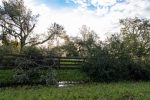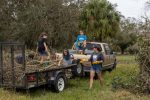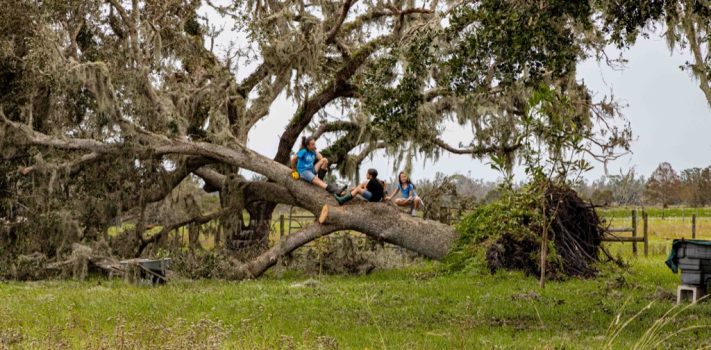(Continued from Part 2. This concludes the article.)
Aftermath
 Awake before dawn to survey the damage, we found that two thirds of the barn roof lay in various pastures within a quarter-mile radius. The radio antenna that was attached to the barn was bent in a C-shape. A sheet of roofing must have hit it. A massive live oak tree had toppled over on its side, roots exposed. Many branches had snapped off other oak trees, some as big around as my waist. Leaves were gone from the tops of all the trees. Lower branches seemed to fare much better.
Awake before dawn to survey the damage, we found that two thirds of the barn roof lay in various pastures within a quarter-mile radius. The radio antenna that was attached to the barn was bent in a C-shape. A sheet of roofing must have hit it. A massive live oak tree had toppled over on its side, roots exposed. Many branches had snapped off other oak trees, some as big around as my waist. Leaves were gone from the tops of all the trees. Lower branches seemed to fare much better.
Thursday was a bit of a daze. We walked around picking up stuff everywhere. Neighbors all checked in with each other to see if anyone suffered physical injury. Everyone suffered property damage, and some worse than others. Our house came through fine.
Time to fire up Genny. Opening the electrical panel and disconnecting the grid power breaker, I then slid the “lock out” protector and connected the generator breaker. I quickly checked the oil and fuel levels, connected the batteries and hit the starter. It always brings a smile to my face when Genny comes alive. After letting her get up to operating temperature, all there was to do was close the circuit and “Let there be light!” We were up on full backup power. Everything that would work on grid power was working on backup power. Even with the AC, dryer, and everything else running, we were using only about 35% of the generator capacity.
After past hurricanes I generally run the generator for about 4 hours in the morning and 4 hours in the evening. This gives the freezers and refrigerator time to cool down. We can get the meals served easily. We have time to wash up and cool off after a day’s work cleaning up after the storm. The generator burns a little less than a gallon per hour. The power grid was down from Wednesday night till Saturday evening. The outage was much shorter than I expected.
Friday, I drove Mom back into town. One of the larger ranchers had a ranch hand using a frontend loader pushing trees off our road to clear a way for us to get out to the hard road. You know you have a great location when neighbors look out for one another.
 Damage to infrastructure was not as bad as I anticipated. Knowing that power would likely not be out for very long (more than 5 days), I decided to let the generator run much longer simply for the convenience of having power. My wife is a photographer, and she spent the morning documenting the damage for insurance and any other resources we may need. Photograph all the damage you incur. This includes the house, barn, fences, and downed trees. Our accountant suggested that we may be able to deduct clean-up expenses from the storm. We will need photos for the insurance claim.
Damage to infrastructure was not as bad as I anticipated. Knowing that power would likely not be out for very long (more than 5 days), I decided to let the generator run much longer simply for the convenience of having power. My wife is a photographer, and she spent the morning documenting the damage for insurance and any other resources we may need. Photograph all the damage you incur. This includes the house, barn, fences, and downed trees. Our accountant suggested that we may be able to deduct clean-up expenses from the storm. We will need photos for the insurance claim.
Lessons Learned
1. Hurricanes are no fun! I have been through a few in my lifetime. None have been fun, and this one was frightening.
2. God is good. Throughout the storm I found myself quoting Nahum 1:7 “The Lord is good, a stronghold in the day of trouble; and He knoweth them that trust in Him.” That’s a good word during a hurricane.
3. Preparation done in past years may not be good enough for the present. Before Hurricane Ian in 2022, my son-in-law and I put additional fasteners in the roof of the barn. We put in a new screw next to the existing screw along the seams that overlap and along the edge at the top and bottom. I had become confident in the condition of the barn roof. I failed to consider that the roof had encountered at least 3 hurricanes over the last few years. Each event surely loosened and stressed the roof. I did go up on the roof prior to Helene to lower the radio antenna, but did not notice any problems. A closer inspection may have been needed. On the other hand, there may not have been anything to be done. Nothing is hurricane-proof.
4. I need to write a SOP for Genny. Starting up the generator and switching over from the grid to the backup is a bit complicated. I walked the son-in-law through it and realized that it is not a simple process. Since my wife writes operation manuals for a living, that should be within our ability. While we are at it, maybe writing an overall Hurricane SOP is in order.
5. I am constantly amazed how livestock survive a storm. I am pretty much out of the cattle business now. I did have a hobby herd but now just raise a few head of beef for the freezer. The cattle survived without issue. The rancher next to me pushed his herd of 100 mommas and their calves into a small 7-acre pasture next to mine the day after Milton in order to get them to higher ground. One of my heifers decided to go visit. How do I cut my heifer out of that herd? Actually, it was surprisingly easy. I feed my cows a bit of sweet feed a couple times a week to keep them gentle. A little scratch behind the ear, some smooth talk, and a consistent “cattle call” to bring them in. When I went over to the neighbor’s pasture with a bucket of sweet feed the herd ran away, and my heifer came running up. I opened the gate, and she walked right through. The cow knows the master’s voice and comes to him. There is a Sunday school lesson there somewhere. The moral of the story is that you must check fences after a storm. Trees brought fences down in at least three places on my small pastures.
6. Livestock does not always make it through a hurricane so well. A local dairyman lost over 250 head after hurricane Ian. He attributed it to shock, but cattle can panic. I have seen that happen when helping ranchers during roundup. A herd can start moving in a circular direction when nervous or panicked. Smaller calves and even larger cows can be trampled. Perhaps putting cows in smaller numbers would help prevent panic. That’s just a thought.
7. You must run equipment like the generator and tractor on a regular basis. Use it or lose it. Unfortunately, I have not kept up with the tractor. Having not run it for a couple of months the injector pump must have dried up. This is more than just bleeding the injectors to get air out of the lines. My mobile mechanic tells me there is a piston in the injector pump that has frozen up and will not bring up fuel. Likely if I had been starting the tractor every month it would not have dried up. I could really use that tractor now! Lesson known, now lesson learned.
8. Most gas generators are loud. The neighbors had gas generators on either side of me. As soon as I walked out the door of my house, I could hear their generators running. One was powering only his refrigerator and a few lights. The MEP-804, Genny, is specified by the military as “tactical quiet.” It is! Standing on the porch of my house I cannot hear Genny running in the barn 95 feet away. I can hear my neighbor’s gas generator running 118 yards away. Many earlier articles have explained why you may not want everyone knowing that you have a generator, and power, and food, and stuff they may want. Tactical quiet is the way to go. The other neighbor’s gas generator ran for less than an hour and quit.
LP generators are also loud, I could hear an LP Generac running on the other side of my neighbor with the working gas generator. The nice thing about the Generac is that many are auto-starting and begin running as soon as the grid goes down. That has its positive and negative points. I like having control of when my generator runs and when I can shut it down.
9. Why did the electricity come up so fast this time? We are in a rural area and generally are the last to come back up on the grid. Line workers have told me that it is because the grid in our area has been hardened. After Hurricane Ian in 2022 the weak points in our local electrical infrastructure have been identified and replaced. Power easements have been cleared and readied for storms. This may be why those in Tennessee and the Carolinas are suffering more so than those of us in Florida.
10. Cellular phone service will also go down. The towers can be damaged, and backup generators don’t always start. Cell towers are tied into the copper trunk which can be damaged. Don’t count on your cell phone for communication. In our area the local fiber network provider is quite reliable. It is a small outfit that started doing “Broadband to the Boonies” during Obama’s initiative to bring the Internet to rural areas. Their network has been up through the last several hurricanes we have been through. This means that because our phones are connected to our home network and the local provider us up, we can text and call. That is, when the generator is running. Routers and modems need power. When I got out of Wi-Fi range for the phone, I had no cell phone communications.
11. Remember my comm check with my daughter using the Baofeng on FRS? Well, that did not work after the storm. It’s time to dive down the Ham hole. Elmer, are you out there?
12. A quick word about doors. One of the things that we specified when building the house was that exterior doors swing outward. My reason for this is that when hurricane winds blow against the door the pressure pushes against the entire door frame. If the doors open inward, then the door is held in place by the hinges and the lock bolt. The lock bolts are only in one small portion of the door and do not distribute the load. Ask a “door kicker” if they want to kick open an inward-opening door or an outward-opening door. Think about it.
13. Also, many of the new McMansions being built around here have double-opening, inward-opening doors. This is the situation for my sister-in-law. During Milton they noticed the door was buckling inward. This concerned them so much that during the storm they screwed a 2×4 across the door to add support. They feared the framed glass doors would push in. What a nightmare.
14. Hurricane clean-up is a great opportunity to train the younger generation in the use of tools and equipment. I was able to spend some time with my son-in-law showing him how to “read” a fallen tree, where the tension points are and how to avoid some of the dangers involved in cutting up downed trees. My younger grandchildren learned to pitch in cleaning up at their level. Even the youngest (6-years old) learned how to sort out the stainless steel fasteners from the ferrous fasteners that were scattered around the barn floor when the roof came off.
15. The clean-up period is going to be hot. It may be fall, but this is Florida. Today we had our first morning below 70 degrees. Running a chainsaw, clearing branches, and getting up on a metal roof to clear away the damaged roofing sheets is hot work! Stay hydrated. Wear a hat and sunscreen.
16. We have also had a lot of rain lately, which means the swamp angels and mosquitoes are out in force — lots of them. Have bug spray ready.
17. Have extra gloves on hand. When people show up to lend a hand, they often show up unprepared. Be glad for the help and be ready to equip them with the basics. We have a box full of rubber boots also. The ground was wet, and there was an inch or two of surface water everywhere except for the house and barn area.
Interestingly, my active Army nephew asked if he needed to request leave to come and help clean up. He said he remembered how we all pitched in the cleanup at mom’s house when he was a kid. Difficult times bind family and friends together.
18. Check on your neighbors. Our place is about halfway down a 5-mile-long dirt road to nowhere. (Another positive feature learned from an article years ago in SurvivalBlog.) When neighbors ride out in their side-by-sides flag them down and chat. This is a time to get to know each other better than just “wave to your neighbor” when passing on the road. Everyone I talked to had some damage, but nothing major. Everyone had a story. It helps to tell your story or to listen to one. One of my young colleagues at school had a friend from college die when a tree came down from a spin-off tornado from Milton. If I hadn’t checked up on him and listened, we would not have known he was hurting from the loss. Just because you come through the storm without much damage doesn’t mean everyone does.
Into each life some rain must fall. We don’t necessarily know what catastrophic storm is gunning for us, but we can take measures now to mitigate the losses when that day does finally come. This synopsis of our learning may help you think through weather events and other calamities that you may be prone to in your area of the country. We will never regret the time we spent discussing possibilities, making plans, building with purpose so that we could weather this storm with a modicum of resilience and comfort.










